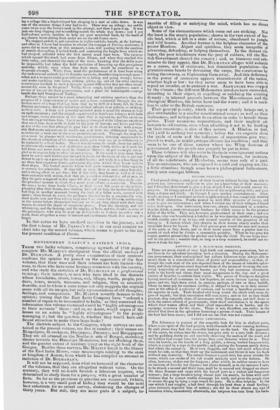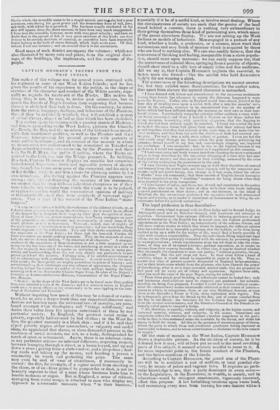MONTGOMERY MARTINS EASTERN INDIA.
THESE two bulky volumes, comprising upwards of 1700 pages.. complete Mr. MARTIN'S abridgment from the official sutvej s of Dr. BUCHANAN. A pretty close examination of their contents confirms the opinion we passed on the appearance of the first volume, that their uses and their interest are both limited—the
uses, to those who have some business connexion with the country,
and who study the statistics of Dr. BUCHANAN as a professional trainit,g ; their interest, to men who have lived in the districts
whose boundaries, rivers, towns, soil, tillage, woods, people, pro- duce, taxes, morals, manners, and religion, they so minutely describe, and to whom a mere name not only suggests the original scene with all its images, but calls up associations of old thoughts, feelings, and companions. Mr. MARTIN covertly demurs to this opinion; stating that the East India Company have "ordered a Dumber of copies to be transmitted to India," as they conceived the
information this volume contained would be " highly advantageous to their servants" there : and so, no doubt, would copies of the
leases on an estate be " highly advantageous" to the people managing it ; but the que.tion is, whether they would have suf- ficient attraction to make three large books ? The districts subject to the Company, whose surveys are con- tained in the present volume, are five in number; their names are
B Lag ul poor, G, luck puor, Dinajepoor, Puraniya, and Ronggopoor.
They are all situated on the Northern side of Bengal, stretching thence towards the Himalaya Mountains, but not rhaching them,
and tire greater extent of territory lying on the right bank of the Ganges. Besides these surveys, Mr. MARTIN found in the library of the East India House, some manuscripts relating to the state or kingdom of Assam, from which he has compiled an account in imitation of Dr. BUCHANAN'S.
It will not be supposed, from what we have said of the character of the volumes, that they are altogether without value. On the contrary, they will no doubt furnish a laborious inquirer, who determined to study them for a purpose, with a great number of facts. So far as the provinces in question are concerned, (which, however, is a very small part of India,) they would be the next best substitute for an actual survey, abstracting the changes of thirty years. But still, they are mere parts of a subject, in-
itteiwo muservo.
I had passed along a great part of their frontier without having been able to procure unv intercourse sufficient rcorse su to give inc a knowledge of their manners; and I therjfore determined to give a feast, which I was told would answer the purpose. At Gauge:prase! I invited those of the neighbouring hills, and gave them a dinner and drink. At Ninon I gave another entertainment. After. wards, so long as I cuutinued in their neighbourhood, I was completely worried - with their atteutinns. Flocks poured in with little presents of honey, and eager to give me iutormation ; and when I visited any of their villages, I found every door open. Our intercourse,. however, always tertninated in a solicita-
tion for drink, a most extravagant fondness for winch seems to be the greatest - foible of the tribe. They are, however, good-natured in their cups ; and one of them, who was brandishing a hatchet as be was dancing amidst a staggering crowd, readily gave it up to me, and seemed sensible of' the propriety of my taking it. A custom which they observe in their deuces clearly marks their insatiable desire for liquor. The chief person goes round the men and women of the party as they dance, and in their turns pours from a pitcher into the mouth of each what he thinks a reasonable quantity. When he has gone the sound, another person tikes the pitcher and helps the chief. No one helps him- self to the pitcher ; sensible that, so lung as a drop remained, he could not re- move it from his lips.
DOWNFAL OC A BLACK.NIAIL NOBILITY.
There are many chiefs of very high birth and extensive possessions, but no one lives in the splendour becoming such a situation. During the Muhainme-
dan government, their undisciplined but gallant followers were always able to secure them in ci considerable share of power and respectability ; so that, al- though the rude state of the arts deptived them of the means of suitable splen- dour, and their religious creed deprived them of the means of showing the con- vivial hospitality of our ancient herons, yet they had nutnerous attendants, both in the battle and chase, their Ionia' occupations in the day, and a .great variety of beauties to enliven their nights. The power of European disetpline having rendered all resistauce to law hopeless, its stern decrees having taken place, and the high-born chief, in custody, perhaps, of two or three bailiffs, whom he must pay for common civility, is obliged to hang on in daily attend- ance at the office of a collector of revenue, and to treat a beardless penman as his superior in rank. Their kindred still hang round the chiefs with some de- gree of regard ; but that consolation will soon cease; and so far as they think prudent, they naturally shun all intercourse with Europeans, and still more so with the native officers of government ; their chief consolation is in the sports which their wastes afford, and their chief expenditure is in hawks, and the equipage necessary for the chase. There is not, therefore, one native in the district that lives in the splendour becoming a person of rank. Their houses at the best had been mean; and I did not see one that was not ruinous.
TAKING CROCODILES.
The fishermen in pursuit of the crocodile look for him in shallow parts, where sonic spots of the land project, with chaunels of water running between. In such places they find the crocodile basking on the land. On the approach of the canoe, be retires into the water, but goes only to a very little distance ; and by paddling slowly on arid carefully observing the motion of the weeds and air bubbles that escape flout his lungs, they soon discover where he is. They then fix loosely, on the handle of a long paddle, a strong barbed harpoon-iron, which is joined by a rope to the paddle; ana, putting the harpoon gently down, fiati where the animal is. He is very sluggish, and does not move when they touch his side, so that they draw up the iustrument and thrust it into his back without any dexterity. The animal flounces a good deal, but never attacks the canoe, which one stroke of his tail would instantly send to the bottom. Ile often, however, shakes out the harpoon ; after which, he neither seems to have an increase of ferocity nor shyness, but allows himself, as in the instance I saw, te be struck a second and third time, until he is secured and dragged on shore. He there flounces and snaps with his tumid jaws in a violent and dangerous manner ; but a large bamboo being thrust into his mouth, he bites with such violence that he cannot readily disengage his teeth, and gives the people time to secure the gag by tying a rope round his jaws. Ile is then helpless. lathe one which I saw caught, a ball fired through his head from a small fowling- piece instantly deprived him of motion nor did he show almost any sign of sensation when, immediately afterwards, the harpoon was torn from his back.
capable of filling or satisfying the mind, which has no direct object in view. Some of the circumstances which come out are striking. Not the least is the scanty population ; shown in the vast extent of fer- tile land, which is left in a state of nature, abandoned to jungle and wild beasts. Another feature is the helpless character of the poorer Hindoos. Abject and spiritless, they seem incapable of advancing, defending, or helping themselves. In the distant
vil- lages, the poor inhabitants were the prey of robbers, till the Bri- tish Government cleared the country ; and, so timorous and sub- missive do they appear, that Dr. BUCHANAN alleges wild animals as a cause, not of stationary, but diminished population—the graminivorous beasts by devouring the crops, the carnivorous by eating the owners, or frightening them away. And this deficiency in the power of resistance appears characteristic of the nation, • whether high or low : fur they never seem to have been able to repeal an invader, or to protract a war. ALEXANDER was stopped by the climate ; the different Mahometan invaders have succeeded, according to their object, in expelling or subduing the existing dynasty; in internal quarrels between the Mussulmans and the aboriginal Hindoos, the latter have had the worst ; and it is need-
less to refer to the British successes. •
Their general pverty, which the report clearly brings out, is also attributable to a similar constitutional cause; as well as their listlessness, and indisposition to exertion in order to benefit them- selves. Their numerous superstitions, and their implicit ad- herence to old custom, even when admitting it not to be binding on their conscience, is also of this nature. A Hindoo, in fact, will yield to nothing but necessity ; before the res angusta dona the pride of' caste and the intlueneo of superstition give way; forced to work, he might perhaps advance his condition ; and they seem to be one of those nations where tile Whig doctrine of government fir the people can properly be put in force.
These volumes will also serve to dissipate some ignorant notions upon the subject of the Hindoos. The temperance, fur instance, of all the inhabitants of Hindustan, seems true only of a part. The mountaineers, who are exposed to a cold and tripping air, like a little stimulus; though some have a philosophical forbearance, rarely seen amongst Libbers.
On the whole, the crocodile seems to be a stupid animal, and toegoake but a poor residence, considering his great power and the tremendous force of tail, jaws, and teeth, with which be is provided. The baldness usually attributed to his skin will appear, from the above account, to have been very much exaggerated. I have seen the crocodile, however, move with very great velocity; and have no doubt that in the pursuit of fish it uses great exertions of this kind; nor does it seem to be entirely destitute of cunning, as crocodiles have been repeatedly found lurking in the fords of rivers through which high •roads pass. Of this, indeed, I saw one instance ; and am assured that it is not uncommon.
Good maps of each district accompany the volumes ; which are also illustrated by many cuts and plans, from the original draw- ings, of the buildings, the implements, and the costume of the people.



























 Previous page
Previous page